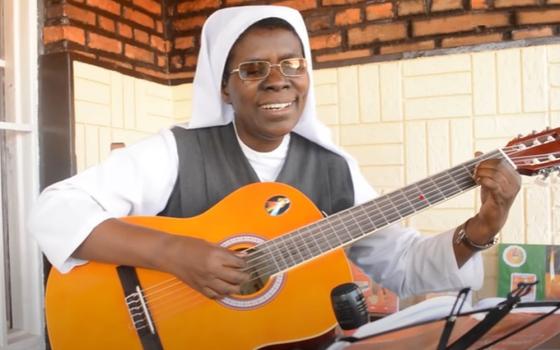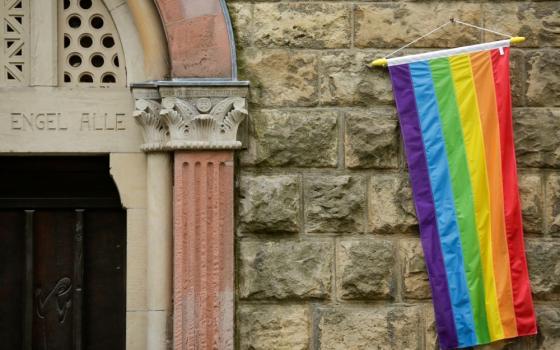Jesus came into the world to homeless refugees, into abject poverty, on the outskirts of a brutal empire, and the story goes that on that night, a chorus of angels appeared to impoverished shepherds, singing "Glory to God in the highest and peace on earth!" The child grew up to become, in Gandhi's words, "the greatest nonviolent resister in the history of the world."
This week, tens of millions of Christians across the country will celebrate the birth of the Prince of Peace. Right along with them, Bush and Cheney, and their legions of hawks and warriors, will attend church and make merry around the table. But the very next day they'll resume Herod's imperial project -- the ongoing massacre of the innocents. The U.S. wages war in Iraq, Afghanistan, Colombia and elsewhere. It crushes the hungry and homeless, the imprisoned and the refugee, and maintains upon their feeble backs the world's ultimate terrorist threat -- a huge nuclear arsenal.
Like Herod and Pilate, we too rebuff the angels' proclamation of "peace on earth." Nonetheless, it hangs on the air. And behind it, if we listen, lies a summons of sorts, a summons to embrace the gift and welcome its fullness, here and now.
The Hindu Gandhi was asked one Christmas for his thoughts on the day. Christmas, he said, has social, economic, and political implications. There's a correlation between the wood of the manger -- the mark of Christ's poverty -- and the wood of the cross -- the price of Christ's nonviolent resistance to evil. Gandhi apprehended the matter right. It's high time the church does the same -- to discern correlations and see implications. In the true Christmas spirit, let me list a few.
First, Christmas celebrates, not just the birth of a baby meek and mild, but a life of perfect nonviolence. And implied in the celebration is the call that we look to Jesus to cultivate nonviolent lives of our own. Celebrating without cultivating mocks Jesus' ethos of peace. Thus we're summoned to study, teach, practice and experiment with nonviolence -- all of this so that peace one day will reign on earth. If we support the war on Iraq, or our nuclear weapons, or our imperial domination, we do not honor Christ; we mock him, and Christmas turns into widespread social hypocrisy.
Christmas calls us to live a disarmed life, with the vulnerability of children, in solidarity with the children of the world, and for their sakes, especially, to face the empire and its servants.
Christmas reveals that God sides with the poor and not the powerful. God becomes one with the poor, walks among them, befriends them. Thus Christmas, despite the clamoring of Neiman Marcus and Bloomingdale's, highlights the miseries of poverty and demands that we work to abolish it. Food for all, clothing, housing, healthcare, education, employment, dignity, a lifetime of peace -- these are the promises of Christmas for the world's children and vulnerable and impoverished. Thus we're to turn from greed, give our possessions and money to the needy. The Christmas vision is that we undertake the same journey of solidarity with the disenfranchised that Christ modeled.
Christmas ushers us to the margins, where God is found. "Peace on earth" escapes our grasp until we regard every human as infinitely beautiful to God, a beloved son or daughter. The marginalized, the outcast, the outsider -- they are our brothers and sisters and peers. From now on, we reject exclusivity, racism, sexism, and discrimination of any kind. We go to the margins and join them there. Only then can peace be made and humanity reconciled.
Next we must look ahead to the end of the story. The child journeyed from the pauper's crib to the empire's cross. Such a bloody outcome is crucial to the story. It beckons us to work for the abolition of the death penalty. Christ must never die again -- in the tortured and the condemned. The angels' song demands that the killing stop once and for all.
And that, of course, includes the stopping of war. We must treat everyone as a sibling. Thus war is disallowed. One cannot heed the angels without opposing war and pressing for its abolition. In particular, the spirit of Christmas urges us to denounce Bush's war on our Iraqi sisters and brothers. To demand an end to the occupation. To insist on bringing the troops home. The angelic vision requires of America that it pay out massive reparations to heal Iraq's land and clear the rubble and set things right. Peace on earth requires nothing less than that we be held accountable for the horrors we inflict on the Middle East.
Next, the angels' celebrating "peace on earth" tells us something of who they are. They are environmentalists. Thus we too have to protect the earth, oppose its destruction, halt global warming, find alternatives to fossil fuels, defend God's creatures, and help make the earth a place of peace for every form of life.
Peace on earth, the angels sang. But nuclear weapons threaten earth with fire and brimstone. Christmas urges us to work for their abolition. They are idolatrous and blasphemous, poised to supplant God and disintegrate God's good work. Their very existence insults the God of peace and mocks the nonviolent Jesus. There is a dark chasm indeed in celebrating Christmas while at the same time working at Los Alamos, Livermore Labs, the Nevada Test Site, or the Pentagon, or for that matter, serving in the National Guard, the Air Force, the Marines, or the Navy. As for the rest of us, our remaining silent mocks the spirit of Christmas and shears it of meaning.
Finally, there's something heraldic in the angels' song, something sudden and startling. A kind of laying of responsibility. We sense it in the phrase: "And the shepherds were afraid." We're ill-equipped to hear it: but peace on earth begins with you and me. The thought brings us up short. And it summons us into silence and prayer, the place where we welcome God's peace in our hearts. The place where we find peace with ourselves and our families, friends and neighbors, even our enemies. For in silence, in our daily disciplines of meditation, Gospel-reading, sacrament, almsgiving, and good works, we receive the peaceable vision. We learn how to be human in an inhuman time.
Perhaps it boils down to that -- being human in a callous world. God wants to be human; all we need do is be human, too. Christmas inspires modesty and vulnerability as strength, nonviolence and compassion as the perfect life. Then even the likes of us can confront the Herods and Pilates of our day. We too can walk from the margins through nonviolent resistance to the cross and God's reign of nonviolence. There's no finer way to honor Christmas than to heed the angels' cosmic song, to join that hymn of praise and sow God's seeds of peace on earth.
John Dear's latest book, You Will Be My Witnesses, is available from Orbis Books. For information, see: www.fatherjohndear.org.




